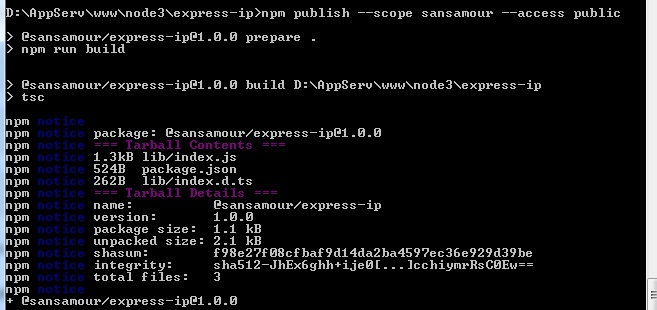Step 1: init package
mkdir name-typescript-package && cd name-typescript-package npm init -y
Example:
mkdir express-ip && cd express-ip npm init -y
Result:
D:\AppServ\www\node3>mkdir express-ip && cd express-ip
D:\AppServ\www\node3\express-ip>npm init -y
Wrote to D:\AppServ\www\node3\express-ip\package.json:
{
"name": "express-ip",
"version": "1.0.0",
"description": "",
"main": "index.js",
"scripts": {
"test": "echo \"Error: no test specified\" && exit 1"
},
"keywords": [],
"author": "",
"license": "ISC"
}
Step 2: install typescript
npm i --save-dev typescript
Result:
D:\AppServ\www\node3\express-ip>npm i --save-dev typescript npm notice created a lockfile as package-lock.json. You should commit this file. npm WARN express-ip@1.0.0 No description npm WARN express-ip@1.0.0 No repository field. + typescript@4.4.2 added 1 package from 1 contributor and audited 1 package in 7.943s found 0 vulnerabilities
Step 3: configuration Typescript:
npx tsc --init
Result:
D:\AppServ\www\node3\express-ip>npx tsc --init message TS6071: Successfully created a tsconfig.json file.
Step 4: edit file tsconfig.json
{
"compilerOptions": {
"target": "es2015" /* Specify ECMAScript target version: 'ES3' (default), 'ES5', 'ES2015', 'ES2016', 'ES2017', 'ES2018', 'ES2019', 'ES2020', or 'ESNEXT'. */,
"module": "commonjs" /* Specify module code generation: 'none', 'commonjs', 'amd', 'system', 'umd', 'es2015', 'es2020', or 'ESNext'. */,
"declaration": true /* Generates corresponding '.d.ts' file. */,
"outDir": "./lib" /* Redirect output structure to the directory. */,
"strict": true /* Enable all strict type-checking options. */
},
"include": ["src"], /* Typescript source code */
"exclude": ["node_modules", "test"]
}
Step 5: write your own codes
Example: create file ./src/index.ts
import * as geoip from 'geoip-country'
export function getIpInfo (ip:string) {
var lookedUpIP = geoip.lookup(ip);
if (!lookedUpIP){
return { error: "Error occured while trying to process the information" }
}
return lookedUpIP;
}
export function getIpInfoMiddleware (opts={DEVIP:'1.1.1.1'}){
return function (req:any, res:any, next:any) {
var xForwardedFor = (req.headers['x-forwarded-for'] || '').replace(/:\d+$/, '');
var cfConnectingIp = req.headers['cf-connecting-ip'] || '';
var incapClientIp = req.headers['incap-client-ip'] || '';
var xSucuriClientIp = req.headers['x-sucuri-clientip'] || '';
var ip = cfConnectingIp || incapClientIp || xSucuriClientIp || xForwardedFor
ip = (ip && ip.split(",").shift()) || req.connection.remoteAddress;
if (ip.includes('::ffff:')) {
ip = ip.split(':').reverse()[0]
}
if ((ip === '127.0.0.1' || ip === '::1')) {
ip = opts.DEVIP || '1.1.1.1'
}
req.ipInfo = { ip, ...getIpInfo(ip) };
next();
}
}
Step 6: edit file package.json
{
"name": "@sansamour/express-ip",
"version": "1.0.0",
"description": "",
"main": "lib/index.js",
"types": "lib/index.d.ts",
"scripts": {
"test": "echo \"Error: no test specified\" && exit 1",
"prepare" : "npm run build",
"build": "tsc"
},
"keywords": [],
"author": "",
"license": "ISC",
"devDependencies": {
"typescript": "^4.4.2"
},
"files": [
"lib"
]
}
Step 7: install dependencies:
Example: npm i geoip-country
D:\AppServ\www\node3\express-ip>npm i geoip-country npm WARN @sansamour/express-ip@1.0.0 No description npm WARN @sansamour/express-ip@1.0.0 No repository field. + geoip-country@4.0.83 added 31 packages from 23 contributors and audited 32 packages in 9.256s 1 package is looking for funding run `npm fund` for details found 0 vulnerabilities
npm i --save-dev @types/geoip-country
D:\AppServ\www\node3\express-ip>npm i --save-dev @types/geoip-country npm WARN @sansamour/express-ip@1.0.0 No description npm WARN @sansamour/express-ip@1.0.0 No repository field. + @types/geoip-country@4.0.0 added 1 package from 1 contributor and audited 33 packages in 2.882s 1 package is looking for funding run `npm fund` for details found 0 vulnerabilities
Step 8: build
D:\AppServ\www\node3\express-ip>npm run build > @sansamour/express-ip@1.0.0 build D:\AppServ\www\node3\express-ip > tsc
Step 9: test your package:
Create file test/test.js
const request = require('supertest');
const express = require('express');
const {getIpInfoMiddleware} = require('../lib/index');
const app = express();
app.use(getIpInfoMiddleware());
app.get('/ipInfo', function(req, res) {
res.status(200).json(req.ipInfo);
});
request(app)
.get('/ipInfo')
.expect('Content-Type', /json/)
.expect(200)
.end(function(err, res) {
if (err) throw err;
console.log(res.body);
});
Edit file package.json
"test": "node test/test.js",
Install dependencies:
npm install supertest --save-dev npm install express --save-dev
Run:
D:\AppServ\www\node3\express-ip>npm run test
> @sansamour/express-ip@1.0.0 test D:\AppServ\www\node3\express-ip
> node test/test.js
{ ip: '1.1.1.1', range: [ 16843008, 16843263 ], country: 'AU' }
Step 9.2 (Option): create file .npmignore
/ignore /.gitignore /node_modules /.npmignore /.git
Step 10: publish to NPM
Login npm: npm login
Result:
D:\AppServ\www\node3\express-ip>npm login Username: sansamour Password: Email: (this IS public) tutorialspots.com@gmail.com Logged in as sansamour on https://registry.npmjs.org/.
Publish: npm publish --scope sansamour --access public
Result:
D:\AppServ\www\node3\express-ip>npm publish --scope sansamour --access public > @sansamour/express-ip@1.0.0 prepare . > npm run build > @sansamour/express-ip@1.0.0 build D:\AppServ\www\node3\express-ip > tsc npm notice npm notice package: @sansamour/express-ip@1.0.0 npm notice === Tarball Contents === npm notice 1.3kB lib/index.js npm notice 524B package.json npm notice 262B lib/index.d.ts npm notice === Tarball Details === npm notice name: @sansamour/express-ip npm notice version: 1.0.0 npm notice package size: 1.1 kB npm notice unpacked size: 2.1 kB npm notice shasum: f98e27f08cfbaf9d14da2ba4597ec36e929d39be npm notice integrity: sha512-JhEx6ghh+ije0[...]cchiymrRsC0Ew== npm notice total files: 3 npm notice + @sansamour/express-ip@1.0.0





